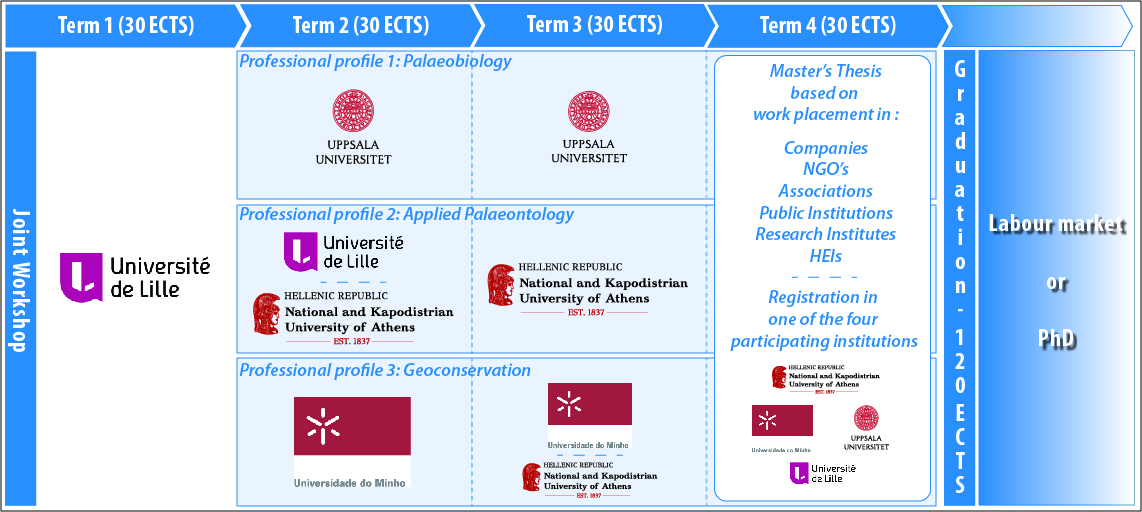THE PANGEA MASTER PROGRAMME
Pangea is the first and unique Erasmus Mundus Joint Master Degree in Palaeontology. The educational aim of the programme is to qualify students to a level of excellence in one of the three specialised fields of Earth Sciences: Palaeobiology, Geoconservation and Applied Palaeontology.
This 2-year study programme of excellence, leading to 120 credit Master’s diplomas (see awarded degrees ), was designed to meet the renewed international demand for qualified graduates with dedicated training and experience in fundamental and applied palaeontology.
After a first term of strengthening their background in Lille University, students have the opportunity to specialise and move according to three professional profiles: research in palaeobiology, applied palaeontology (stratigraphy, basin analysis and reservoir, environmental paleontology), and geoheritage (science communication, networking, management).
The programme courses are taught in English at all partner institutions.
The programme structure is as follow.

First common term in the University of Lille (30 ECTS)
All students will be welcomed in Lille and will participate in integration events, including compulsory workshops (including seminar by guest speakers) and field-trip.
The goal of this first term is to homogenize and strengthen students background to the level required by the different tracks they are involved in, going through a broad spectrum of topics, from basin analysis (sedimentology and sequence stratigraphy, biostratigraphy), geoconservation, geobiology, climatology, to quantitative palaeontology.
Second pre-orientation term (30 ECTS)
The second semester marks the first differentiation from teaching basic knowledge in the Palaeontology fields towards the application in Paleobiology (focus on research) at Uppsala, in Geoconservation-Geoheritage at Braga and in Applied Palaeontology at Athens (NKUA) or Lille.
- Students involved in the paleobiology stream will all move to Uppsala University in order to deepen their knowledge in palaeontology, and to get introduced to the relationships between evolution and development.
- Students registered to the Applied Palaeontology stream will be offered the opportunity to stay in Lille, where a professional placement is intended, along with field-trip-training, so they can train and acquire further skills in basin analysis. They can also move to Athens where they will train in environmental applications, and deepen their knowledge in quaternary geoenvironments and climatic change.
- Student participating to the Geoconservation stream will move to Braga where they will get benefit of strongly professional oriented training with ⅔ of the term dedicated to work placement (including one compulsory placement into associated geoparks).
Third specialisation term (30 ECTS)
- During the third semester, students engaged in the Paleobiology stream will stay at Uppsala where they will complete their skills.
- Students in Applied Paleontology will develop their skills in (geo)environmental analysis and associated techniques at Athens (NKUA).
- Students engaged in the Geoconservation stream have the opportunity to move to Athens or to stay in Braga according to their personal professional project. In Athens, courses will have a strong focus on geomorphology and georisk along with management of coastal zones. In Braga, students will have advanced courses on Geotourism in Geopark and protected areas, including characterisation and assessment of their environmental impacts, to be able to challenge now and ahead to associate land use and sustainability.
Fourth specialisation term: work placement and master thesis (30 ECTS)
The Master thesis will be written based on work placement either in a research laboratory of a partner university or in an associate partner organisation or any other company, NGO’s, or institution offering oriented topic for the master thesis. In any case, an agreement will be signed between the student, the company/laboratory/